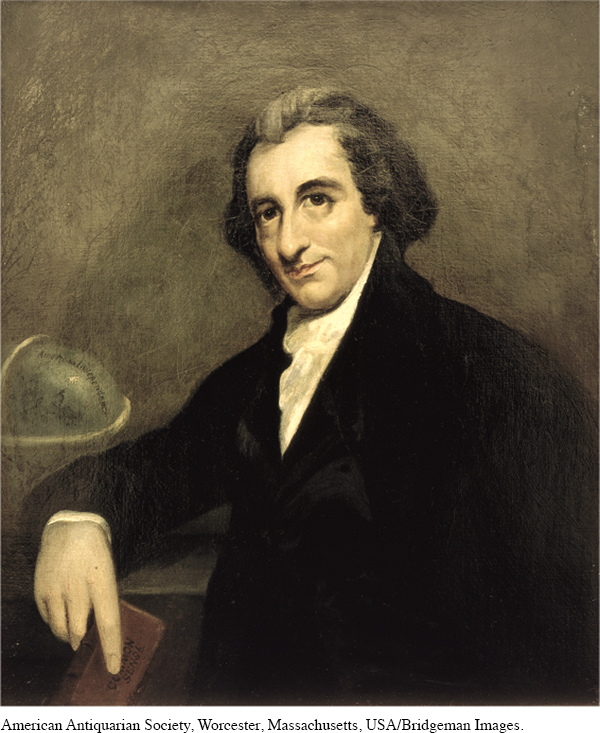The American Promise: Printed Page 169
The American Promise, Value Edition: Printed Page 157
The American Promise: A Concise History: Printed Page 181
Thomas Paine, Abigail Adams, and the Case for Independence

Pressure for independence started to mount in January 1776, when a pamphlet titled Common Sense appeared in Philadelphia. Thomas Paine, its author, was an English artisan and coffeehouse intellectual who had come to America in the fall of 1774. With the encouragement of members of the Second Continental Congress, he wrote Common Sense to lay out a lively and compelling case for complete independence.
The American Promise: Printed Page 169
The American Promise, Value Edition: Printed Page 157
The American Promise: A Concise History: Printed Page 181
Page 170In simple yet forceful language, Paine elaborated on the absurdities of the British monarchy. Why should one man, by accident of birth, claim extensive power over others? he asked. A king might be foolish or wicked. “One of the strongest natural proofs of the folly of hereditary right in kings,” Paine wrote, “is that nature disapproves it; otherwise she would not so frequently turn it into ridicule by giving mankind an ass for a lion.” Calling the British king an ass broke through the automatic deference most Americans still had for the monarchy. To replace monarchy, Paine advocated republican government based on the consent of the people. Rulers, according to Paine, were only representatives of the people, and the best form of government relied on frequent elections to achieve the most direct democracy possible.
Paine’s pamphlet sold more than 150,000 copies in a matter of weeks. Newspapers reprinted it; men read it aloud in taverns and coffeehouses; John Adams sent a copy to his wife, Abigail, who passed it around to neighbors in Braintree, Massachusetts. New Englanders desired independence, but other colonies, under no immediate threat of violence, remained cautious.
Abigail Adams was impatient not only for independence but also for other legal changes that would revolutionize the new country. In a series of astute letters to her husband, she outlined obstacles and gave advice. She worried that southern slave owners might shrink from a war in the name of liberty: “I have sometimes been ready to think that the passion for Liberty cannot be Equally strong in the Breasts of those who have been accustomed to deprive their fellow Creatures of theirs.” And in March 1776, she expressed her hope that women’s legal status would improve under the new government: “In the new Code of Laws which I suppose it will be necessary for you to make I desire you would Remember the Ladies, and be more generous and favourable to them than your ancestors.” Her chief concern was husbands’ legal dominion over wives: “Do not put such unlimited power into the hands of the Husbands,” she advised. “Remember all Men would be tyrants if they could.” Abigail Adams anticipated a more radical end to tyranny than did Thomas Paine.
John Adams dismissed his wife’s concerns. But to a male politician, Adams privately rehearsed the reasons why women (and men who were free blacks, or young, or propertyless) should remain excluded from political participation. Even though he concluded that nothing should change, at least Abigail’s letter had forced him to ponder the exclusion, something few men—